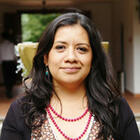
Laura Romero graduated with a degree in ethnohistory from the National School of Anthropology and History (ENAH) in 2001. In 2002 he began his fieldwork in the Nahua area of the Sierra Negra of Puebla where he has been conducting his research since then. In 2003 he began his master's studies in Mesoamerican Studies at the Faculty of Philosophy and Letters of the UNAM. In that same year he received the Fray Bernardino de Sahagún National Prize awarded by the National Institute of Anthropology and History together with CONACULTA for the best degree thesis in Social Anthropology and Ethnology. This prize was also awarded to him, for the second time, in 2007, for his master's thesis.
In 2006 he entered the doctorate in Anthropology of the Institute of Anthropological Research of the UNAM from which he graduated in 2011, the same year he entered the National System of Researchers.
In 2014 she received the Scholarship for Women in the Social Sciences and Humanities granted by the Mexican Academy of Sciences and the Science Advisory Council of the Presidency of the Republic.
From 2015 to 2020 he led a CONACYT-funded project to understand indigenous categories of disability, specifically in Nahua children in the Sierra Negra de Puebla. The purpose of this research was to understand the consequences that these categories have on the relationship of indigenous peoples with the Mexican State.
In addition to the above, due to its interests in justice, it initiated a project to describe the situation of the indigenous population deprived of liberty in the state of Puebla. Project with which he begins a new stage of his academic career.
Along with all of the above, he has written three books and coordinated two more. Published numerous book chapters and academic articles. In addition to directing more than twenty theses.





